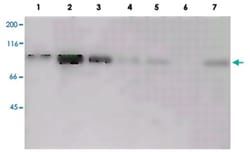CTNNB1, Mouse, Clone: BDI480, Abnova™
Manufacturer: Abnova Corporation
Select a Size
| Pack Size | SKU | Availability | Price |
|---|---|---|---|
| Each of 1 | 89-135-546-Each-of-1 | In Stock | ₹ 1,18,993.00 |
89-135-546 - Each of 1
In Stock
Quantity
1
Base Price: ₹ 1,18,993.00
GST (18%): ₹ 21,418.74
Total Price: ₹ 1,40,411.74
Antigen
CTNNB1
Classification
Monoclonal
Conjugate
Unconjugated
Dilution
ELISA (0.05 ug/mL) Western Blot (0.5 ug/mL for HRP/ECL detection) Immunocytochemistry (1-10 ug/mL) The optimal working dilution should be determined by the end user.
Host Species
Mouse
Quantity
100 μg
Primary or Secondary
Primary
Target Species
Canine, Human, Mouse
Form
Lyophilized
Applications
ELISA, Immunocytochemistry, Immunohistochemistry (Paraffin), Western Blot
Clone
BDI480
Description
Mouse monoclonal antibody raised against synthetic peptide of CTNNB1.
Formulation
Lyophilized from 2X PBS (PEG, sucrose, 0.09% sodium azide)
Immunogen
A synthetic peptide corresponding to CTNNB1.
Regulatory Status
RUO
Test Specificity
Specifically interacts with beta-catenin. The alpha-, beta- and gamma-catenins are cytoplasmic proteins mediating the interaction of Ca2+ -dependent transmembrane adhesion molecules (cadherins) with the cytoskeletal network. The direct interaction of beta-catenin with the cytoplasmic domain of cadherins plays a crucial role for cell-cell adhesion and signal transmission between neighboring cells. Recent studies indicate that beta-catenin may also play a role in tumorigenesis since it forms complexes with the tumor suppressor gene product APC. Beta-catenin directly interacts and constitutively activates transcription factors of the TCF/LEF gene family. Thus it is proposed that beta-catenin plays a dual role not only in the maintenance and regulation of cell-cell interactions but also in the regulation of gene activity. Cross reacts with human, mouse and dog.
Content And Storage
Store at 4°C on dry atmosphere. After reconstitution with deionized water store at -20°C or lower. Aliquot to avoid repeated freezing and thawing.
Isotype
IgG1

